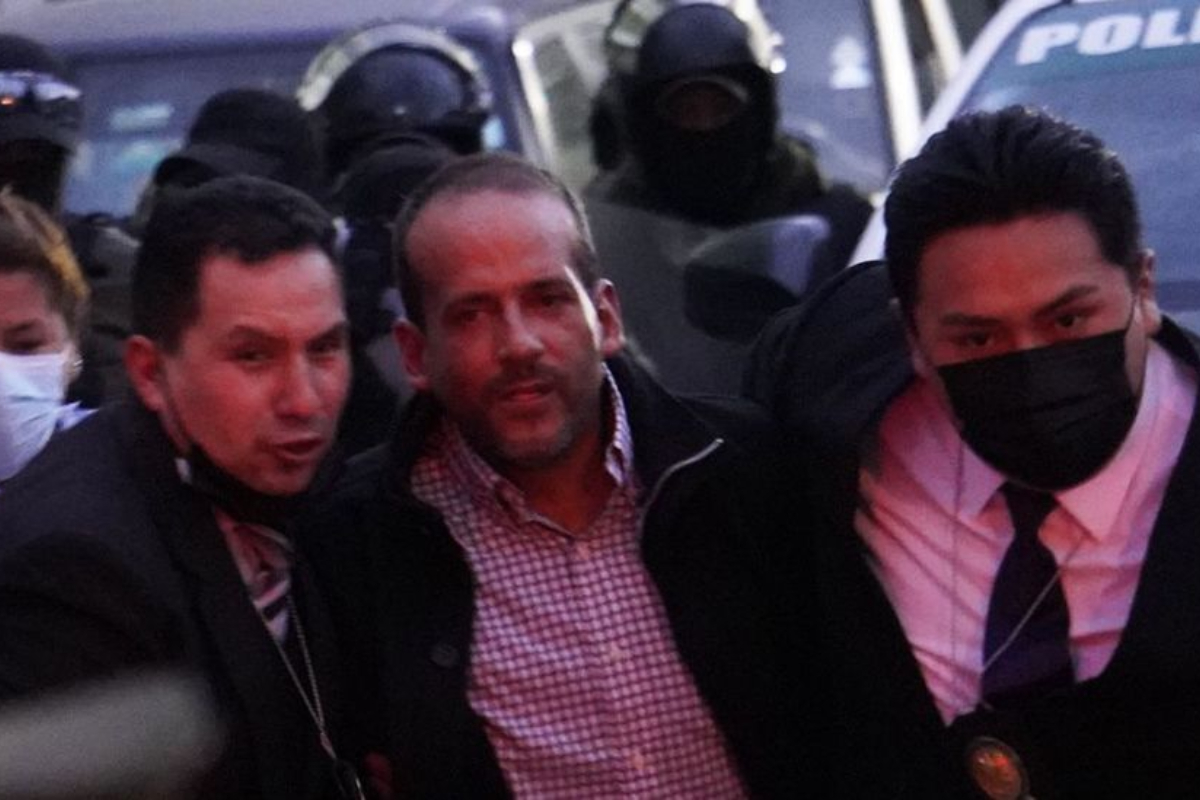- Bolivia’s violence has increased since an opposition leader’s arrest.
- Wednesday, police arrested Governor Luis Fernando Camacho.
- He is accused of “terrorism,” according to an arrest warrant filed in October.
Bolivia has experienced a rise in the number of violent protests in response to the arrest of a key opposition politician.
The right-wing governor of Santa Cruz province, Luis Fernando Camacho, was taken into custody by armed police on Wednesday in what his supporters described as “a kidnapping-like operation.”
According to a prosecutor from Bolivia, Mr. Camacho’s pre-trial custody was requested for six months.
One of Bolivia’s most contentious politicians is the governor.
Holding him in detention, according to prosecutor Omar Mejillones, was a “precautionary measure.”
Mr. Camacho led the protests that resulted in the resignation of left-wing former president Evo Morales from his base of influence in Santa Cruz.
Additionally, he has criticized the left-leaning administration of Luis Arce.
According to the state attorney’s office, Mr. Camacho, 43, was detained as part of an investigation into the circumstances surrounding President Morales’ ouster in 2019, which it referred to as a “coup d’état.”
He is accused of “terrorism,” according to an arrest warrant filed in October, without providing any other information.
His supporters have criticized the operation that resulted in his arrest on Wednesday.
Following the arrest of a prominent opposition politician, violent protests have erupted in Bolivia.
The right-wing governor of Santa Cruz province, Luis Fernando Camacho, was taken into custody by armed police on Wednesday in what his supporters described as “a kidnapping-like operation.”
According to a prosecutor from Bolivia, Mr. Camacho’s pre-trial custody was requested for six months.
One of Bolivia’s most contentious politicians is the governor.
Holding him in detention, according to prosecutor Omar Mejillones, was a “precautionary measure.”
Mr. Camacho led the protests that resulted in the resignation of left-wing former president Evo Morales from his base of influence in Santa Cruz.
Additionally, he has criticized the left-leaning administration of Luis Arce.
According to the state attorney’s office, Mr. Camacho, 43, was detained as part of an investigation into the circumstances surrounding President Morales’ ouster in 2019, which it referred to as a “coup d’état.”
He is accused of “terrorism,” according to an arrest warrant filed in October, without providing any other information.
His supporters have criticized the operation that resulted in his arrest on Wednesday.
“People dressed in black with black guns got out and they started hitting the windows. They didn’t even tell us to get out, they just hit them with the back part of the weapons,” she told news agency.
Video from the scene showed one of the car windows was broken and witnesses said Mr. Camacho was beaten before being thrown on to the ground and handcuffed while his security detail was tear gassed.
He was quickly transferred by helicopter to La Paz where he spent the night in a police cell.
In a statement released by his office, Mr. Camacho said he had been “brutally kidnapped” and dismissed the allegations against him as “lacking truth and credibility”.
But Evo Morales, who in 2019 resigned from the presidency after 14 years in office as mass protests stoked by Mr. Camacho swept through the country, welcomed it.
“Finally, after three years, Luis Fernando Camacho will answer for the coup d’état that led to robberies, persecutions, arrests and massacres of the de facto government,” he said.
In the midst of demonstrations over claims of vote-rigging in the 2019 election, Mr. Morales resigned as president after the army chief persuaded him to do so.
Right-wing senator Jeanine ez succeeded him as president for a year before Morales ally Luis Arce won the election in a second round.
The events of 2019 have been criticized by Mr. Morales and his supporters as a power grab, and Jeanine ez has subsequently been given a 10-year prison term for “decisions against the constitution.”
Supporters of Mr. Camacho worry that due to his involvement in the 2019 protests, he may suffer a similar fate.
In his home province, word of Mr. Camacho’s detention circulated rapidly. In Santa Cruz, his followers shut down traffic and set fire to the attorney general’s office.
In an apparent effort to stop Mr. Camacho from being taken to Bolivia’s administrative capital, La Paz, they also briefly halted operations at the city’s two airports.
Unrest in Santa Cruz, Bolivia’s economic hub and largest agricultural region, has the potential to have a significant impact outside of the province’s borders.
A 36-day general strike in Santa Cruz last month caused projected damages to Bolivia of $1 billion (£830 million).
Mr. Camacho was the instigator of the walkout and wanted to move up the census by a year.
Residents of Santa Cruz hope the census, which was supposed to take place in 2022 but was postponed by the government until 2024, will reflect their expanding population and political clout, leading to the grant of more congressional seats and an increase in tax revenues.
At the end of November, the strike was called off when lawmakers passed a bill stipulating that it would take place in 2024 with no additional extensions allowed.
However, the compromise was not well received in Santa Cruz, and the detention of their governor is likely to lead to new strikes.
[embedpost slug=”bolivias-opposition-leader-claims-presidency-after-morales-stepped-down/”]





















